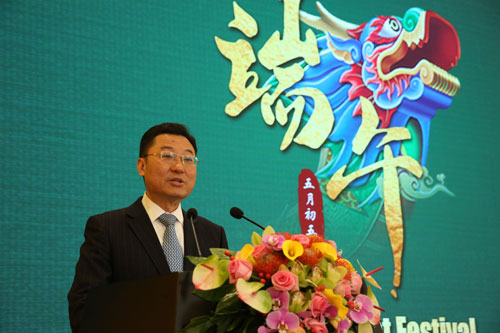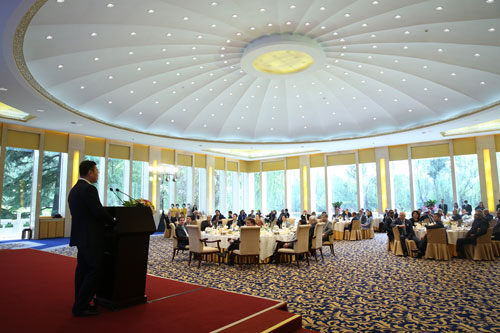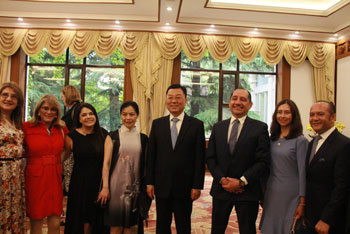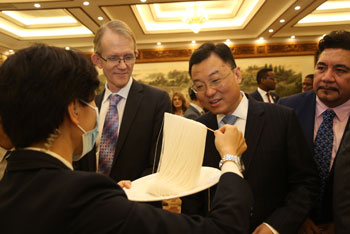
On June 12, 2021, Vice Foreign Minister Xie Feng delivered remarks at the gathering to celebrate the Dragon Boat Festival with diplomatic envoys and Chargé d'affaires a.i. of the countries of North America, Oceania, Latin America, and the Caribbean. He pointed out, over 72 years since the founding of the New China, the CPC has turned in an impressive score sheet, and created three miracles that are rarely seen in the world.
The first miracle is fast economic development. Under CPC's leadership, China has achieved an economic takeoff. China has realized industrialization in just a few decades, which took developed Western countries several centuries. China now has the most complete modern industrial system in the world, and becomes the second largest economy and the biggest trader in goods. China's GDP was 67.9 billion yuan in 1952, and 90.03 trillion yuan in 2018, up by 174 times in real terms. Per capita GDP soared by 70-fold, from 119 yuan to 64,600 yuan. Scholars call it "the greatest economic revolution in the history of mankind". Early in the 1980s, China already met its people's basic needs for food and clothing. Today, grain output is as high as 650 million tons per year. Getting enough to eat is not a problem anymore. What the Chinese people care about today is how to eat well and healthy.
The second miracle is long-term social stability. The CPC has stood the great tests, the formidable and complex task of development and reform, the economic and social changes, among others. And it has effectively preserved long-term political and social stability in China. Sustaining social stability depends not only on the volume of wealth to be added to the society. More importantly, it also depends on how far poverty reduction can go. Making the cake bigger and dividing it fairly are both important. China is able to achieve long-term stability thanks to its fast development as well as its commitment to equity and justice. In the early days of reform and opening-up, Mr. Deng Xiaoping put forth a policy to let some people and some regions prosper before others, so that they can help the underdeveloped regions to catch up for common prosperity. President Xi Jinping has made it clear that we will leave no one behind as we pursue moderate prosperity in all respects and for all the Chinese people. Today, the middle-income population in China is over 400 million, and as many as 800 million people have emerged from poverty. This is unprecedented in the human history.
The third miracle is peaceful rise. New China abandoned the obsolete colonialist path of traditional powers. China always pursues an independent foreign policy of peace. Over the past seven decades, China never provoked a war, or took an inch of land from any other country. China is the only country in the world that incorporates peaceful development into its Constitution. Some claim that a growing power is bound to seek hegemony. But China's millennia-old wisdom tells us that hegemony leads only to failure. China does not seek hegemony. We stand firmly with the world against hegemonism. Words like "coercion" and "bullying" are not in the dictionary of China's diplomacy. We are committed to a new path of state-to-state engagement, a path that advocates dialogue and partnership, instead of confrontation or alliance. We seek to grow our friendship and cooperation with all countries based on the Five Principles of Peaceful Coexistence. We advocate equality among all countries, regardless of their size, wealth and strength. We respect the rights of people of all countries to choose their own development path. We oppose the strong bullying the weak or seeking supremacy. China is always a force for peace, development and progress.

Xie Feng said, if there is any secret code of success, it has mainly three elements:
First, the CPC is a party of mission that represents the overall interests of the Chinese people. In a multiparty country, political parties usually represent the interests of particular groups. They are parties of segmental interests and of electoral politics. Their primary goal is to win the elections, take office and protect the interests of certain groups. The CPC is a party of overall interests, a party of mission and responsibility. CPC members are communists, patriots and internationalists, all at the same time. CPC members are revolutionists guided by ideals. Our original aspiration and mission is to seek happiness for the people, rejuvenation for the nation, and the common good for the world.
In some multiparty countries, people do recognize the serious problems such as the gaping wealth gap and racial tensions. Yet constrained by factional interests and vote bases, they either find it hard to make up their mind or are unable to address the root causes of the problems. China also has its share of challenges in resolving economic and social issues. What is different is that the CPC has no selfish calculations, and therefore we proceed from the overall and long-term interests of the greatest majority of the Chinese people. We make resolute decisions and ensure that they deliver.
China's political party system is neither a multiparty, bi-party, nor a one-party system. It is a new system of multiparty cooperation and political consultation under the leadership of the CPC. The decision-making process is rigorous and efficient. The political game of "opposition for opposition's sake" and endless partisan strife is thus avoided.
As a party of mission and responsibility, the CPC is able to overcome shortsightedness, populism and other weaknesses of parties of segmental interests and of electoral politics. We are able to maintain policy consistency, make long-term, sustained investment, stick to our agenda and carry out hard work over generations. Over the past 70-plus years, the CPC has led the Chinese people in formulating and implementing 13 five-year plans. Right now we are implementing the 14th. The CPC members, generation over generation, have forged ahead with resolve and fortitude, and fulfilled one major, tough task after another.
 |
 |
Second, the CPC adapts Marxism to the Chinese context. The CPC does not just copy and paste any doctrine; it applies the theory to China's realities, and turns it into something of our own, and writes new chapters of Marxism. We are able to reflect on our past experience, while not clinging to any development model that has been proven wrong; we are able to raise the idea that China should "blaze a path of our own and build a socialism with Chinese characteristics", while not veering toward capitalism or democratic-socialism; we are able to replace the planned economy with a socialist market economy, while rejecting the practices of neo-liberalism; we are able to fully engage China in economic globalization in the course of opening-up, while keeping independence and initiative.
Chairman Mao Zedong proposed the ways toward victory such as "encircling the cities from the countryside" and "seizing political power from the barrel of a gun". They were once viewed as heretical by the Communist International. Later they were proven very relevant to the Chinese realities, and became an important outcome of adapting Marxism to the Chinese context. During the debate on whether reform and opening-up represents a capitalist or socialist road, and what should be the right relationship between planning and market, Mr. Deng Xiaoping put forth a set of criteria of "three favorables" (namely determining whether what we do is favorable to growing the productive forces in a socialist society, to increasing the overall strength of the socialist state, and to raising people's living standards). In his view, whether there is a little more planning or a little more market was not the essential difference between socialism and capitalism. He was firmly resolved to advance the socialist market economy with Chinese characteristics. And that brought the Marxist theory of political economy to a whole new high. President Xi Jinping has proposed a new development philosophy of "innovative, coordinated, green, open and inclusive development for all" to promote high-quality economic development, the commitment to upholding and improving the socialist system with Chinese characteristics, and the need to modernize China's system and capacity for governance. These ideas have further enriched and developed the Marxist philosophy, the theory of political economy and scientific socialism. The systems of people's congresses, CPC-led multiparty cooperation and political consultation, regional ethnic autonomy, and self-governance at the primary level are created by the CPC as suited to China's realities, and consistent with the basic principles of Marxism.
All things considered, the CPC is different from the capitalist parties in the world. It is different from the communist parties in other countries, too. The CPC is not another Communist Party of the Soviet Union.
Third, the CPC embraces self-reform to stay vibrant and resilient. The CPC always faces up to its mistakes, corrects them, and bravely embraces self-reform, no matter how painful it is. From the Zunyi Meeting to the establishment of the democratic path with Chinese characteristics, from the "two musts" put forward by Chairman Mao at the 2nd Plenary Session of the 7th CPC Central Committee in March 1949 to the historic turning point of setting wrong things right and steering China toward reform and opening-up at the 3rd Plenary Session of the 11th CPC Central Committee in 1978, and to the fight against corruption since the 18th National Congress of the CPC, the CPC grows up by reforming itself every step of the way. While modernizing China, the CPC has never ceased in modernizing itself. These two processes have complemented and reinforced each other, and taken together, have contributed to the success story of China.
